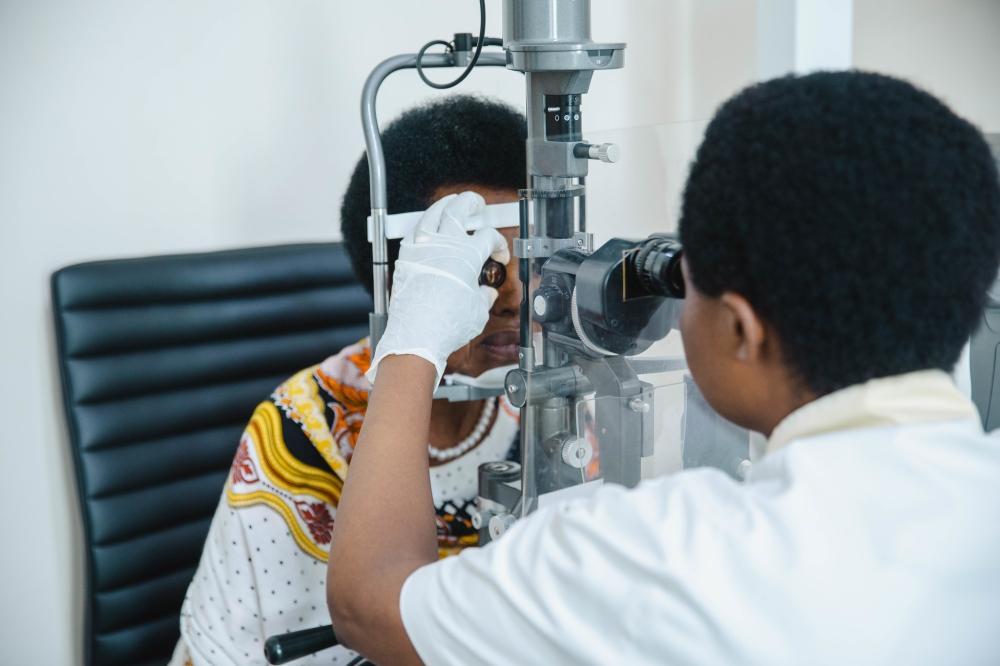Vincent Mutabazi
Africa-Press – Rwanda. Eye conditions are remarkably common. Those who live long enough will experience at least one eye condition during their lifetime. Vision impairment means that a person’s eyesight cannot be corrected to a “normal” level. Vision impairment may be caused by a loss of visual acuity, where the eye does not see objects as clearly as usual. It may also be caused by a loss of visual field, where the eye cannot see as wide an area as usual without moving the eyes or turning the head. Vision disability is one of the top 10 disabilities among adults 18 years and older and one of the most prevalent disabling conditions among children.
According to the World Health Organization (WHO), globally, at least one billion people have a near or distant vision impairment that could have been prevented or has yet to be addressed. In the absence of timely detection, reduced or absent eyesight can have long-term personal and economic effects.
Vision impairment affects people of all ages, with the majority being over the age of 50. Young children with early onset severe vision impairment can experience lower levels of educational achievement, and in adults, it often affects quality of life through lower productivity, decreased workforce participation and high rates of depression.
It’s time to start taking eye health seriously. Start practicing some good habits in your daily routine to help protect your vision for years to come. Study after study has shown that people fear vision loss more than they fear cancer, stroke, heart disease and other serious ailments. But while most adults assume they’re well-versed in vision facts, few actually are. And that lack of knowledge only increases their risk. Our eyes are incredibly complex organs, and understanding how they work and what factors can affect them is crucial for maintaining good vision. Regular eye check-ups, proper eye protection, and healthy habits like balanced nutrition can go a long way in preserving eye health.
A national survey conducted in Rwanda in 2018 revealed a significant prevalence of visual impairment is about 3.7% and uncorrected refractive error is about 2.2% emphasising the need for Primary Eye Care (PEC). The study underscores that about a third of the population could benefit from PEC, with higher demand among older individuals and women. It emphasises the necessity for universal PEC to address unmet eye health needs, especially among marginalised groups, advocating for equitable access for all.
Eye care doesn’t have to be complicated or expensive. Simple measures like regular eye exams, wearing appropriate eyewear, and maintaining overall health can go a long way in preserving vision and preventing eye problems.
Promoting awareness about proper eye hygiene and the importance of early detection and treatment of eye conditions can make eye care more accessible and manageable for everyone.
Ensuring optimal eye health involves several key practices that can easily be carried out at home. Scheduling regular comprehensive eye exams to detect any issues early with competent healthcare workers, maintaining stable blood sugar levels in avoiding diabetes, understanding your family’s eye health history to assess your own risks, managing a healthy weight to reduce the chances of developing conditions like diabetes, wearing protective eyewear during activities, avoiding smoking to minimise the risk of eye-related diseases, wearing sunglasses that block UV rays to protect your eyes, taking breaks from screens to prevent eye strain, practicing proper hygiene with contact lenses, prioritising workplace eye safety, and adopting a balanced diet rich in fruits, vegetables, and omega-3 fatty acids for overall eye health. These measures collectively safeguard your vision and promote long-term eye wellness.
As you get older, your risk for some eye diseases may increase. But there’s a lot you can do to keep your eyes healthy. If you already have failing vision, visit your ophthalmologist or optometrist every year. Having an eye exam with an eye doctor is important because most eye diseases can be treated if they are found early. The eye doctor may dilate or enlarge your pupils by putting drops in your eyes. The doctor will also test your eyesight and check for glaucoma. If you have diabetes, it’s also very important to have regular eye check-ups. See an eye doctor immediately if you have any sudden loss of eyesight, blurred vision, eye pain, double vision, redness, swelling of your eye or eyelid, or discharge coming from the eye.
Source: The New Times
For More News And Analysis About Rwanda Follow Africa-Press






